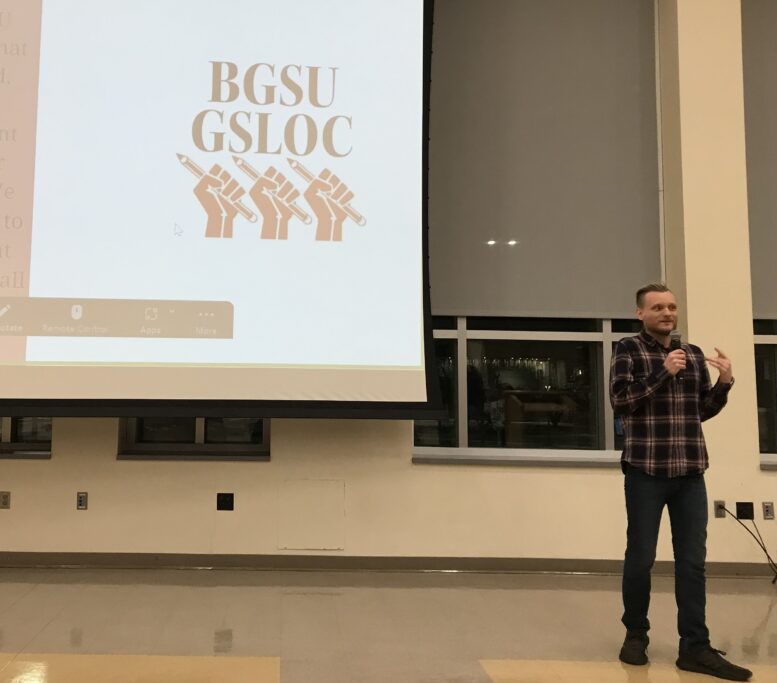By DAVID DUPONT
BG Independent News
Graduate students are expected to give their all to their studies and their jobs, whether teaching or in the laboratory. They often work under financial strains where one mishap can derail their careers.
Last week, the newly formed Graduate Student Labor Organizing Committee convened a town hall meeting to give their peers a chance to air their struggles.
These are stories organizers have heard and shared many times, now they want to make sure the administration hears them as well.
One student had moved to Bowling Green to begin her studies in August. Her stipend had yet to come in. She asked other graduate students what they did. They rolled up their sleeves, and sold their blood plasma, she was told.
Another student later said they carpool to Findlay where plasma fetches a higher price. They study while their veins are tapped.
For two hours students from the audience of about 100 came to the microphone and shared their stories.
They are not organizing a union. It’s illegal for graduate students and adjunct, or part-time, faculty to unionize.
In a letter to the administration, the committee spelled out the essential problems.
Graduate student assistantships are on average $16,000 for nine months. While students don’t have to pay instructional fees, they do have to pay other general fees that average about $3,000, and graduate students are required to have health insurance. The plan the university offers, and which international students must enroll in, costs about $3,000 annually with a $500 co-pay.
But when students seek social services such as SNAP benefits or Medicaid, their pay prices them just out of reach. They are just not poor enough.
Haley Shipley, one of the organizers, spoke of how during her master’s she earned little enough to qualify for Medicaid and food stamps, plus the additional pandemic food stamp benefits. But when she started her doctoral program, she made just too much to qualify for Medicaid, and with inflation the $250 in food stamps every month just doesn’t go as far as it did four years ago.
Since the university would be required to provide health insurance if students worked over 30 hours, all student workers, undergraduate and graduate, have their hours capped at 28.
Graduate students, one speaker said, are providing an important service in teaching undergraduate students. Through the pandemic some were expected to teach face-to-face to students who did not want to wear masks.
John King, another of the organizers of the meeting, spoke of the difficulties he faced. He worked as a student supervisor in administration. Having that job title was important for his resume, but it paid minimum wage.
He asked for an increase but was told that wasn’t possible. Later he rode in an elevator with administrators discussing their bonuses. He drove past Taco Bell and read the sign saying they were paying $14 an hour, 40% more than he was getting.
He worked a second job on campus, 28 hours a week, and that’s not enough.
Yet, he said, he feels grateful to the university.
“My story is this,” he said. “I was a college graduate working two jobs in a major city. Rents seemingly doubled out of nowhere. And I couldn’t keep up. I was homeless when I was accepted to BGSU, and considered BGSU as saving my life. I still think that today, I really do. I love BGSU. But when I got here, I faced many of the same obstacles while trying to complete a degree. Like many other (graduate assistants), my stipend is about $16,000 a year, with almost 40% of that going back to my employer in general fees and the health insurance mandate which less a month to live on than the average rental property in BG.”
Several students said that this makes it difficult to attract graduate students to BGSU, when some other schools better provide for graduate students.
It’s difficult for them to recommend to potential applicants that they seek a BGSU graduate degree.
As King put it: How can you compete with Indiana and Wisconsin when you can’t compete with Taco Bell?
Graduate College Dean Jennifer Waldron attended the session. She declined to say what the administration could do, but praised the organizing committee for giving students the space to share their stories. These “definitely are the challenges I hear quite often,” she said. “Part of my role is finding space to hear and work within the system to find what the next steps are. There’s hope to do so.”
The committee is holding another smaller session to meet with students and encourage them to sign the letter to the administration today, Jan. 25, from 4-5 p.m. at Grounds for Thought.

